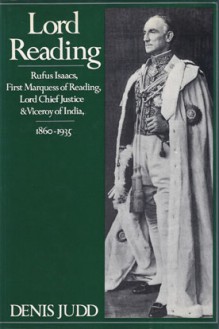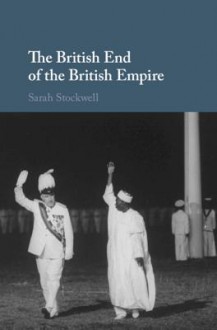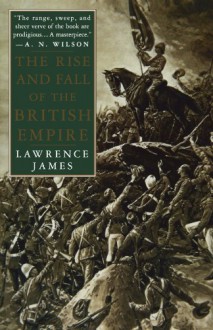



This is a book that I scouted out for a podcast, and I'm glad I did. I'm enjoying it immensely for the way it's getting me to think differently about a subject with which I'm long familiar, in this case the British empire. What Stockwell is doing is looking at the role that certain British institutions — the universities of Oxford and Cambridge, the Bank of England, the Royal Mint, and the Royal Military Academy — played in the British empire during the period of decolonization. I must confess that had never even contemplated the issue, much less how they helped to perpetuate the British legacy in the post-colonial world.

The largest empire in history ended less than a century ago, yet the legacy of how it rose and how it fell will impact the world for longer than it existed. Lawrence James’ chronicles the 400-year long history of The Rise and Fall of the British Empire, from its begins on the eastern seaboard of North American spanning a quarter of the world to the collection of tiny outposts scattered across the globe.
Neither a simple nor a comprehensive history, James looks at the British Empire in the vain of economic, martial, political, and cultural elements not only in Britain but in the colonies as well. Beginning with the various settlements on the eastern seaboard of North America, James describes the various colonies and latter colonial administrators that made their way from Britain to locations around the globe which would have an impact on attitudes of the Empire over the centuries. The role of economics in not only the growth the empire but also the Royal Navy that quickly became interdependent and along with the growth of the Empire’s size the same with the nation’s prestige. The lessons of the American War of Independence not only in terms of military fragility, but also politically influenced how Britain developed the “white” dominions over the coming centuries. And the effect of the liberal, moralistic bent of the Empire to paternally watch over “lesser” peoples and teach them clashing with the bombast of the late-19th Century rush of imperialism in the last century of the Empire’s exists and its effects both at home and abroad.
Composing an overview of 400-years of history than spans across the globe and noting the effects on not only Britain but the territories it once controlled was no easy task, especially in roughly 630 pages of text. James attempted to balance the “positive” and “negative” historiography of the Empire while also adding to it. The contrast between upper-and upper-middle class Britons thinking of the Empire with that of the working-class Britons and colonial subjects was one of the most interesting narratives that James brought to the book especially in the twilight years of the Empire. Although it is hard to fault James given the vast swath of history he tackled there were some mythical history elements in his relating of the American War of Independence that makes the more critical reader take pause on if the related histories of India, South Africa, Egypt, and others do not contain similar historical myths.
The Rise and Fall of the British Empire is neither a multi-volume comprehensive history nor a simple history that deals with popular myths of history, it is an overview of how an island nation came to govern over a quarter of the globe through cultural, economic, martial, and political developments. Lawrence James’s book is readable to both general and critical history readers and highly recommended.